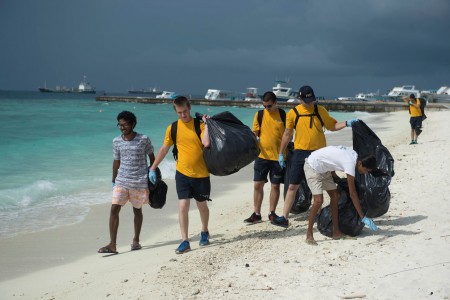No additional reporting by missing journalist Ahmed Rilwan
Police have denied arresting six men yesterday from an independent prayer congregation at the Dharumavantha mosque in Malé, despite media reports to the contrary.
“Reports in some media [outlets] about police arresting people who performed Friday prayers in an independent congregation at the Dharumavantha mosque [on October 3] were published irresponsibly in an attempt to mislead the public,” police insisted in a press release yesterday.
On Wednesday (October 1), police arrested a 34-year-old man for leading an independent prayer congregation and delivering unauthorised Friday sermons at the mosque.
The Imam was taken into custody with an arrest warrant on charges of “attempting to incite religious strife and discord” and leading prayers without authorisation from the Islamic ministry in violation of the Protection of Religious Unity Act of 1994 and regulations under the law.
Police stressed in yesterday’s press release that no further arrests have been made.
“And no one has been summoned to the police headquarters for questioning concerning this case,” police said
Police were not active in the area and no attempts were made to prevent the independent congregation from performing Friday prayers, the press release stated.
Local media reported eyewitness as saying that the Friday prayer was led by former opposition Maldivian Democratic Party (MDP) MP Mohamed Rasheed ‘Kubey’ while a loudspeaker or megaphone was provided by Dhivehi Rayyithunge Party activist Mohamed ‘Eagle’ Shareef.
Both Kubey and Shareef have reportedly been attending the mosque regularly for Friday prayers.
A member of the independent congregation told online news outlet CNM that the mosque’s sound system has not been seen since the Imam was arrested.
“Today the govt acted against radicals but MDP stepped in & helped them spread their message. I thought we were together in this fight,” Home Minister Umar Naseer tweeted late afternoon on Friday.
“MDP will have to decide whether to be with us or with them,” he added.
MDP Chairperson Ali Waheed was not responding to calls at the time of press.
At a press conference last month, Naseer revealed that efforts were underway to stop the independent congregation gathering at Dharumavantha mosque.
“Putting a stop to it is not just physically going there and stopping them sometimes with shields. Due to the nature of the [issue], we want to advise them and explain to them how it is in religion,” Naseer said.
The Islamic ministry had summoned members of the separatist prayer group and conducted “one-to-one” counselling sessions, Naseer revealed.
“Unless all these efforts fail, we will not use the force of law,” Naseer said.
Religious unity
Police noted in a statement last week that the Dharumavantha mosque was not among mosques designated in Malé for Friday prayers.
“And those delivering sermons and issuing fatwas there have not sought authorisation from the Islamic ministry,” police said.
Under the religious unity regulations enacted in May 2010, permission and written approval must be sought from the Islamic ministry to preach, give sermons and issue religious edicts in the Maldives.
Scholars seeking a license to preach are required to have at least a first degree in religious studies from an institution recognised by the government.
In April, President Abdulla Yameen ratified amendments to the Religious Unity Act – which came into force mid-July – outlawing independent or unauthorised prayer congregations.
The penalty for violations of either the law or the regulations is a jail sentence of between two to five years.
In February this year, the Malé City Council posted a notice on the Dharumavantha mosque stating that it would be temporarily shut down at the request of the Ministry of Home Affairs.
The prayer group had been described as “extremist” by Islamic Minister Dr Mohamed Shaheem Ali Saeed.
However, the congregation gathered for prayers the next Friday and prayed for God to destroy the government as well as for victory against the “irreligious” government that was attempting to “obstruct the spreading of Allah’s message”.
The Imam also prayed for God to destroy and send his wrath upon military and police officers who implement the government’s orders.
Despite the notice, the group continued to gather for prayers at the mosque and conduct Friday prayers every weekend at a time earlier than the time set by the Islamic ministry.
Local media reported last month that the Dharumavantha mosque’s Imam accused the government in a Friday prayer sermon of declaring “war” against the congregation.
A prayer was also offered against the government’s alleged efforts against the “true invitation” and for Allah to strike fear into the hearts of police and army officers who might be used stop the unauthorised congregation.
Likes (0)Dislikes
(0)Dislikes (0)
(0)
 (0)Dislikes
(0)Dislikes (0)
(0)